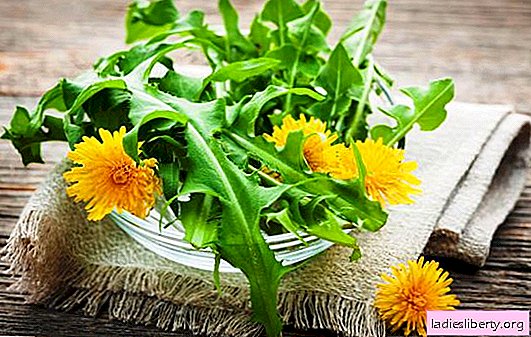
Blooming dandelions in spring can be found on city curbs, and in rural meadows, and on the lawns near any building.
Although this plant is considered a weed, in traditional medicine it is used as an effective cure for many diseases.
Flowers, leaves and even roots - all these parts of dandelion are useful in their own way.
Dandelion: chemical composition and useful properties
Due to the wide variety of biologically active substances in the composition, dandelion is used for diseases of almost all systems and organs of the human body.
Dandelion milky juice contains up to 3% glycosides called taraxacin and taraxacerin. These substances are very necessary for the health of the joints, since they are involved in the propagation of chondrocytes - the basis of cartilage.
Dandelion terpene compounds are important for the vascular system. They synthesize the right cholesterol, which cleanses the blood vessels of bad cholesterol. Thus, the use of dandelion reduces the likelihood of cholesterol plaques in the circulatory system.
Sterols (beta-sterol and sigma-sterol), which are found in large quantities in dandelions, trigger the body's natural cleansing. They are able to bind fat-soluble toxins in the blood and remove them.
Saponins from dandelion juice also cleanse the blood of bad cholesterol, which feeds cancer cells. Thus, dandelion is a powerful anti-cancer agent.
Valuable polysaccharides contained in dandelion also work to cleanse the body. They activate the circulation of the liver-intestines, removing toxins and harmful cholesterol, which the liver has filtered out of the blood.
Carotenoids (lutein, etc.), from which the antioxidant vitamin A is synthesized, are also present in all parts of dandelion. This component helps to fight diseases of the upper respiratory tract, and also supports vision and positively affects the condition of the skin.
Asparagine is a substance necessary for the central nervous system to function. It provides a normal pace of its work, preventing inhibition and excessive excitement. Dandelion is a source of asparagine for vegetarians, as usually people get this substance from animal products.
Dandelion is rich in vitamins A, C, D and E. The percentage of this vitamin cocktail along with other active substances of the plant makes it bactericidal, anti-inflammatory and strengthens the immune system.
Useful properties of dandelion leaves
Dandelion leaves are edible even without prior heat treatment. They are used in salads, in raw food sauces, instead of salad leaves on sandwiches, as well as in green smoothies. In its raw form, dandelion leaves practically do not lose their beneficial properties: vitamins and other trace elements.
The reason for this application is the high content of ascorbic acid (vitamin C), which is destroyed by heat treatment of the product. Vitamin C is involved in the metabolism of almost all substances in the body:
• it has anti-inflammatory and antipyretic effects;
• indispensable for loads of any kind;
• cures scurvy.
The body needs daily replenishment with this vitamin.
Fresh leaves and decoctions from dry raw materials are used to treat kidneys and the bladder. The components of the leaves have a diuretic effect and remove fine sand. With prolonged treatment with infusions and decoctions of dandelion greens, a decrease in the size of stones in the kidneys and bladder is observed. Urinary tract inflammation passes, which allows you to safely remove deposits.
The juice of dandelion leaves contains bitterness, which stimulate the digestive system. With gastritis with low acidity, they increase the secretion of digestive juices. And with cholecystitis - they act as a choleretic agent. These components also stimulate the intestines, which leads to a mild laxative effect. Therefore, dandelion tea is used for constipation.
During enhanced cleansing (diuretic and laxative effect of leaves), potassium is washed out of the body, which is necessary for heart function and normal blood coagulation. But since dandelion leaves themselves contain a large percentage of this element, the body is not harmed.
Useful properties of dandelion roots
The root is the most useful part of dandelion. It contains in high concentration vitamins, minerals and other biologically active substances, which are also present in the terrestrial part of the plant.
In autumn, the dandelion leaves wither, which allows the root to accumulate a large amount (up to 25%) of the polysaccharide called inulin. This element is a plant-based analogue of insulin, which makes dandelion root extremely useful for people with diabetes.
Other beneficial properties of dandelion inulin:
• contributes to the removal of heavy metals and radionuclides;
• increases bone density and prevents bone disease;
• strengthens the immune system.
The root composition is ideal for treating almost all liver diseases. Alone or as part of complex therapy, dandelion root infusion is used for hepatitis B and C, gallstone disease, biliary duct dyskinesia, cirrhosis, hepatosis and other diseases.
The presence of healing components and enveloping mucus in the composition allows the use of dried root powder or its aqueous infusion as an effective remedy for ulcerative colitis. Enveloping the walls of the intestine, the dandelion root heals wounds and protects against new injuries. The laxative effect of the root helps the intestines not work at full strength.
In addition to the fact that the root contains calcium, it also contributes to its absorption. This property is useful for porosis and other bone diseases associated with increased fragility.
A concentrated cocktail of vitamins, bactericidal and anti-inflammatory substances in a dandelion can cure acne, furunculosis, eczema and dermatitis. For this, root preparations are used both externally and internally.
Dandelion root is used as a means of stimulating milk production in nursing women. Compresses with infusion are applied to the mammary glands to relieve inflammation during mastopathy, mastitis, or at the beginning of feeding after childbirth. Tannins of the root help fight tumors in the mammary glands and reproductive organs.
Contraindications to the use of dandelion
With such great benefits of dandelion, uncontrolled consumption of its products can cause significant harm to the human body. The list of diseases for which this plant should not be consumed is quite wide. Here are the most common ones:
• gastritis with high acidity;
• stomach ulcer;
• duodenal ulcer;
• blockage of the biliary tract;
• acute pancreatitis.
Dandelion is also contraindicated in case of diarrhea and a tendency to increased acidity of gastric juice, as it can aggravate this condition.











